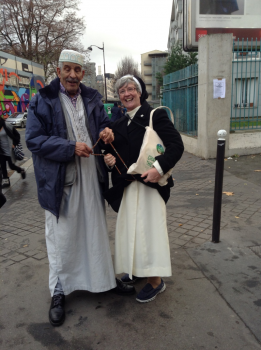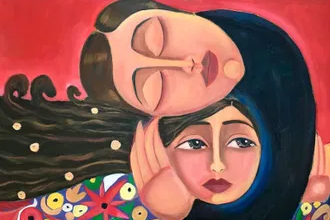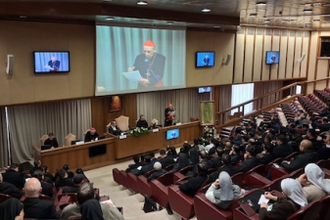Paris blog 13: Making connections

Sr Christina with new friend
My room in Paris is on the fifth floor. Out of the window I can see a large, paved public square, surrounded by multi-storey blocks. It's an expanse of grey with trees planted at precise intervals from each other, each marooned in its own tiny patch of grass. The trees look out of place, as if they are unwelcome guests, barely tolerated in the urban landscape.
The problem of what happens when we become disconnected from the natural world was addressed today in a panel discussion on spirituality and ecology, organised by Catholic development network CIDSE.
The event brought together voices from four continents, reminding us of the words of Pope Francis in Laudato Si' that solutions don't just emerge from one place or one way of thinking about reality. They come from our dialogue with each other.
French theologian Sr Cécile Renouard opened the discussion by referring to Paris attacks as just one example of where religion has become disconnected from its own values. Religion has so often been manipulated to justify violence or used as a way to quiet down revolutions and supress calls for justice. Laudato Si', she argued, shows us how faith can instead be a partner in the struggle for social justice.
Narumon Piboonsittikun, from the Spirit in Education Movement, talked about how we have become disconnected not only from the natural environment, but also from ourselves. We are overloaded by information, but often profoundly disconnected from our own emotions and so left feeling powerless to act. A reconnection of head, heart and hand is what's needed, she said.
The connection between African spirituality and Christian faith was the theme that ran through the next speaker's contribution. Fr Rigobert Minani SJ from the Democratic Republic of Congo, is part of a Church network aiming to protect the Congo Basin as "the second lung of humanity". He spoke of a deep connection with the forest, fostered by traditional initiation rites in which young people enter the forest to learn their role in society. "These are holy places," he told us. "Forests are part of who we are."
This theme was developed further by Brazilian activist Ivo Poletto, who shared the struggles and wisdom of indigenous people in Latin America. Their spirituality and way of life deeply challenges our ideas of personal ownership, either of land or of any natural goods.
He described rituals in which people ask permission of mother earth before fishing or harvesting crops. This took me back to the time I spent visiting CAFOD partner organisations in Bolivia several years ago. On that visit, every time we stopped on the hillside to eat, someone first poured water on the land as a way of saying thank you to mother earth for what she had provided for us. It wasn't just the indigenous farmers in traditional dress who took part. Young staff members from the city, with their jeans and mobile phones, were just as involved.
Ivo urged us all to take seriously this understanding of the earth as our mother. For when we harm her, we harm ourselves too, as we are her children. She is part of us, as we are of her.
In the questions that followed, someone raised the issue of urban spirituality: now that more than half the world's population live in cities, how can we maintain our connection to mother earth, even in our urban environment?
The afternoon provided some answers as we went on an alternative tour of Paris, seeing for ourselves how public art, community gardens and local food markets were providing ways in which urban dwellers could come together to reclaim public space and reconnect to nature. Connections that had been lost were being re-made again.
Yet, it's not just connections with nature, but connections with each other that continually need to be made and re-made. As we followed the tour, a man approached one of our group, Sister Christina. As a Muslim, he was interested by seeing her rosary beads. A conversation began, and they stopped to pray together in the street. Quite by chance, a connection was made.
If we so often feel disconnected from creation and from each other, how much more disconnected must the negotiators feel, as they hammer out the final draft of this climate agreement in the late hours of the night? How hard it must be to remember the reality facing people and planet as they argue over the technical meaning of each line.
A statement released by CIDSE on Saturday, said: "We call for leaders, in the little time left, to do everything possible to make the agreement to listen to the voices of the world's most vulnerable and not to leave them behind. We won't settle with an agreement that doesn't put the people first, and as the Pope said: 'The urgent challenge to protect our common home includes a concern to bring the whole human family together to seek a sustainable and integral development, for we know things can change.'"
Our prayer for these final hours of the talks is that we would truly believe that things can change, and that our voices - connected with our brothers and sisters and creation itself - would cry out for peace and justice.
Sarah Hagger-Holt of CAFOD Campaigns is with a CAFOD group in Paris.


















